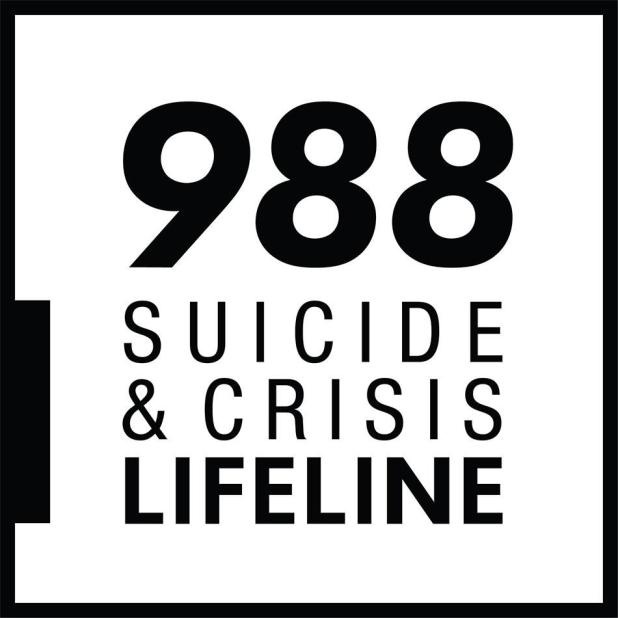
Suicide can be prevented, says 988 Lifeline
Understanding the issues concerning suicide and mental health is an important way to take part in suicide prevention, help others in crisis and change the conversation around suicide, says 988 Suicide & Crisis Lifeline. The Lifeline is funded by the Substance Abuse and Mental Health Services Administration and administered by Vibrant Emotional Health.
The Lifeline website offered the following:
Suicide is not inevitable for anyone. By starting the conversation, providing support, and directing help to those who need it, we can prevent suicides and save lives.
Evidence shows that providing support services, talking about suicide, reducing access to means of self-harm and following up with loved ones are just some of the actions we can all take to help others.
By offering immediate counseling to everyone that may need it, local crisis centers provide invaluable support at critical times and connect individuals to local services.
KNOW THE RISK FACTORS
Risk factors are characteristics that make it more likely that someone will consider, attempt or die by suicide. They can’t cause or predict a suicide attempt, but they’re important to be aware of.
Risks include:
—Mental disorders, particularly mood disorders, schizophrenia, anxiety disorders and certain personality disorders
—Alcohol and other substance use disorders
—Hopelessness
—Impulsive and/or aggressive tendencies
—History of trauma or abuse
—Major physical illnesses
—Previous suicide attempt(s)
—Family history of suicide
—Job or financial loss
—Loss of relationship(s)
—Easy access to lethal means
—Local clusters of suicide
—Lack of social support and sense of isolation
—Stigma associated with asking for help
—Lack of healthcare, especially mental health and substance abuse treatment
—Cultural and religious beliefs, such as the belief that suicide is a noble resolution of a personal dilemma
—Exposure to others who have died by suicide (in real life or via the media and Internet).
KNOW THE WARNING SIGNS
Some warning signs may help determine if a loved one is at risk for suicide, especially if the behavior is new, has increased or seems related to a painful event, loss or change.
If you or someone you know exhibits any of these, seek help by calling the Lifeline.
—Talking about wanting to die or to kill themselves.
—Looking for a way to kill themselves, like searching online or buying a gun.
—Talking about feeling hopeless or having no reason to live.
—Talking about feeling trapped or in unbearable pain.
—Talking about being a burden to others.
—Increasing the use of alcohol or drugs.
—Acting anxious or agitated; behaving recklessly.
—Sleeping too little or too much.
—Withdrawing or isolating themselves.
—Showing rage or talking about seeking revenge.
—Extreme mood swings.
Visit partner sites www.samhsa.gov or www.vibrant.org/ for help or information about suicide.
988 is now the three-digit dialing code that routes callers to the 988 Suicide & Crisis Lifeline.
On July 16, 2022, the 988 Lifeline transitioned away from the National Suicide Prevention Line reached through a 10-digit number to the three-digit 988 Lifeline.
When people call, text or chat with the 988 Lifeline, they are connected to trained crisis counselors who are part of the existing 988 Lifeline network, made up of over 200 local crisis centers.
These crisis counselors are trained to provide free and confidential emotional support and crisis counseling to people in suicidal crisis or emotional distress and connect them to resources. These services are available 24 hours a day, seven days a week, across the United States.
The 988 Lifeline’s network of over 200 crisis centers has been in operation since 2005 and has been proven to be effective. Trained crisis counselors listen, provide support and connect callers to resources when appropriate.
Callers who follow the “press 1” prompt are connected to the Veterans Crisis Line. A Spanish Language line is available by pressing 2, and more than 240 languages are supported through a Tele-Interpreters service.
Callers now also have the option of following a “press 3” prompt to be connected to a crisis counselor specifically trained in supporting LGBTQI+ callers.
Numerous studies have shown that callers feel less suicidal, less depressed, less overwhelmed and more hopeful after speaking with a 988 Lifeline crisis counselor.
